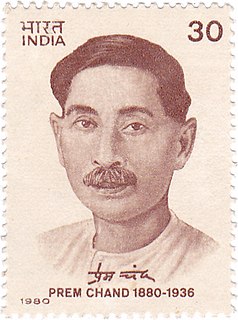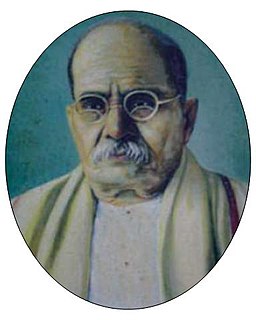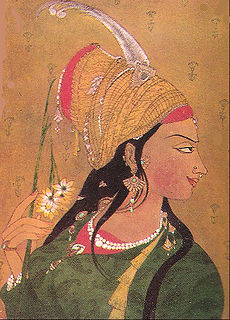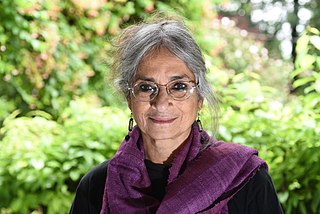Hindi literature includes literature in the various Hindi language which have writing systems. Earliest forms of hindi literature are attested in poetry of Apabhraṃśa like Awadhi, Magadhi, Ardhamagadhi and Marwari languages. Hindi literature is composed in three broad styles- गद्य (Gadya-prose), पद्य( Padya- poetry) and चम्प्पू In terms of historical development, it is broadly classified into five prominent forms (genres) based on the date of production. They are:

Dhanpat Rai Srivastava, better known by his pen name Premchand, was an Indian writer famous for his modern Hindustani literature. Premchand was a pioneer of Hindi and Urdu social fiction. He was one of the first authors to write about caste hierarchies and the plights of women and labourers prevalent in the society of late 1880s. He is one of the most celebrated writers of the Indian subcontinent, and is regarded as one of the foremost Hindi writers of the early twentieth century. His works include Godaan, Karmabhoomi, Gaban, Mansarovar, Idgah. He published his first collection of five short stories in 1907 in a book called Soz-e-Watan.

Rajendra Yadav was a Hindi fiction writer, and a pioneer of the 'Nayi Kahani' movement of Hindi literature. He edited the literary magazine HANS, which was founded by Munshi Premchand in 1930 but ceased publication in 1953 – Yadav relaunched it on 31st July 1986,.
Sadgati is an 1981 Hindi television film directed by Satyajit Ray, based on a short story of same name by Munshi Premchand. Ray called this drama of a poor Dalit "a deeply angry film [...] not the anger of an exploding bomb but of a bow stretched taut and quivering."

Gadar: Ek Prem Katha is a 2001 Indian Hindi-language romantic period action film directed by Anil Sharma and set during the Partition of India in 1947. Loosely based on the life of Boota Singh, the film stars Sunny Deol and Amisha Patel in lead roles alongside Amrish Puri and Lillete Dubey. Sharma's son Utkarsh as a child artist plays Deol and Patel's son, before his first film as an adult, another Sharma directorial Genius (2018). Patel bagged Sakeena's role out of 500 girls who auditioned for the role.
Godaan is a famous Hindi novel by Munshi Premchand. It was first published in 1936 and is considered one of the greatest Hindi novels of modern Indian literature. Themed around the socio-economic deprivation as well as the exploitation of the village poor, the novel was the last complete novel of Premchand. It has been translated into English in 1957 by Jai Ratan and Purushottama Lal as The Gift of a Cow. A 1968 translation by Gordon C. Roadarmel is now considered "a classic in itself".

Nathuram Premi was a writer, publisher, poet, editor, and linguist in the field of Jainism as well as Hindi literature. A budding poet, he wrote under the nom de plume of "Premi". Although belonging to the Digambara sect of Jainism, he adopted a non-sectarian attitude and published and translated many Digambara as well as Śvetāmbara works. Working as a clerk in a firm in Mumbai he rose to establish his own publishing house and bookstore Hindi Granth Ratnākar Kāryālay which published works of many of the biggest names in Indian literature, including Munshi Premchand, Hajariprasad Dvivedi, Jainendrakumar, Yashpal, Swami Satyabhakta, Sharatchandra Chatterjee and Rabindranath Tagore. The bookshop and publishing house now called Hindi Granth Karyalay is now being managed by his grandson and great-grandson 100 years after its establishment.

Ravidas, or Raidas, was an Indian mystic poet-saint of the bhakti movement during the 15th to 16th century CE. Venerated as a guru (teacher) in the modern regions of Uttar Pradesh, Rajasthan, Gujarat, Maharashtra, Madhya Pradesh, Punjab and Haryana, he was a poet, social reformer and spiritual figure.

Erode Venkatappa Ramasamy, revered as Periyar or Thanthai Periyar, was an Indian social activist and politician who started the Self-Respect Movement and Dravidar Kazhagam. He is known as the 'Father of the Dravidian movement'. He rebelled against Brahminical dominance and gender and caste inequality in Tamil Nadu. Since 2021, the Indian state of Tamil Nadu celebrates his birth anniversary as 'Social Justice Day'.

Thaïs is a novel by French writer Anatole France, published in 1890. It is based on events in the life of Saint Thaïs of Egypt, a legendary convert to Christianity who is said to have lived in the 4th century. It was the inspiration for the 1894 opera of the same name by Jules Massenet.

Amarkant was an Indian writer of Hindi literature. His novel Inhin Hathiyaron Se earned him the Sahitya Akademi Award in 2007, and Vyas Samman in year 2009. He was awarded Jnanpith Award for the year 2009. Amarkant is considered one of the prominent writers of the story writing tradition of Premchand but certainly is credited to add something better in that tradition by his own individuality.
Bazaar-e-Husn or Seva Sadan is a Hindustani novel by Munshi Premchand.

Bhagat Munshi Ram, Indian spiritual guru and follower of Baba Faqir Chand.

Gaban (transl. Embezzlement) is 1966 Hindi film directed by Hrishikesh Mukherjee, based on Munshi Premchand's classic novel by the same name. It had Sunil Dutt and Sadhna playing the lead role. The film has music by Shankar Jaikishan, and lyrics were by Shailendra and Hasrat Jaipuri.
Mahyavanshi are a Rajput caste of India.
"Idgah" is a Hindustani story written by the Indian author Munshi Premchand. Written under the pen name Nawab Rai, it is one of the most well-known stories of Premchand.

Syed Imtiaz Ali Taj was a dramatist who wrote in the Urdu language. He is remembered above all for his 1922 play Anarkali, based on the life of Anarkali, that was staged hundreds of times and was adapted for feature films in India and Pakistan, including the Indian film Mughal-e-Azam (1960).

Nirmala is a Hindi fiction novel written by Indian writer Munshi Premchand. The melodramatic novel is centered on Nirmala, a young girl who was forced to marry a widower of her father's age. The plot unfolds to reveal her husband's suspicion of a relationship between her and his eldest son, a suspicion that leads to the son's death.

Parwana (transl. Moth) is a 1947 Indian Hindi-language drama film. It was produced by R. B. Haldia and Pratap A. Rana, and directed by J. K. Nanda. The songs were composed by Khurshid Anwar and became popular. The lyrics were written by D. N. Madhok and Naqshab. The film starred K. L. Saigal, Suraiya, Najma, K. N. Singh, Baby Khurshid and Azurie. It was K. L. Saigal's last film and was released in February 1947, one month after his death in January 1947. Suraiya, who had stated in an interview that she was a big fan of Saigal's, and had already acted in two films with him. The first two were Tadbir (1945) and Omar Khaiyyam (1946). Parwana was their third film together and the most famous.

Sara Rai, is a contemporary Indian writer, editor of anthologies and translator of modern Hindi and Urdu fiction. She lives in Allahabad and New Delhi, India. Rai mainly writes and publishes short stories in Hindi. Written in a reflective prose style, her stories explore the individual complexities in the lives of ordinary people and outsiders in contemporary India.














